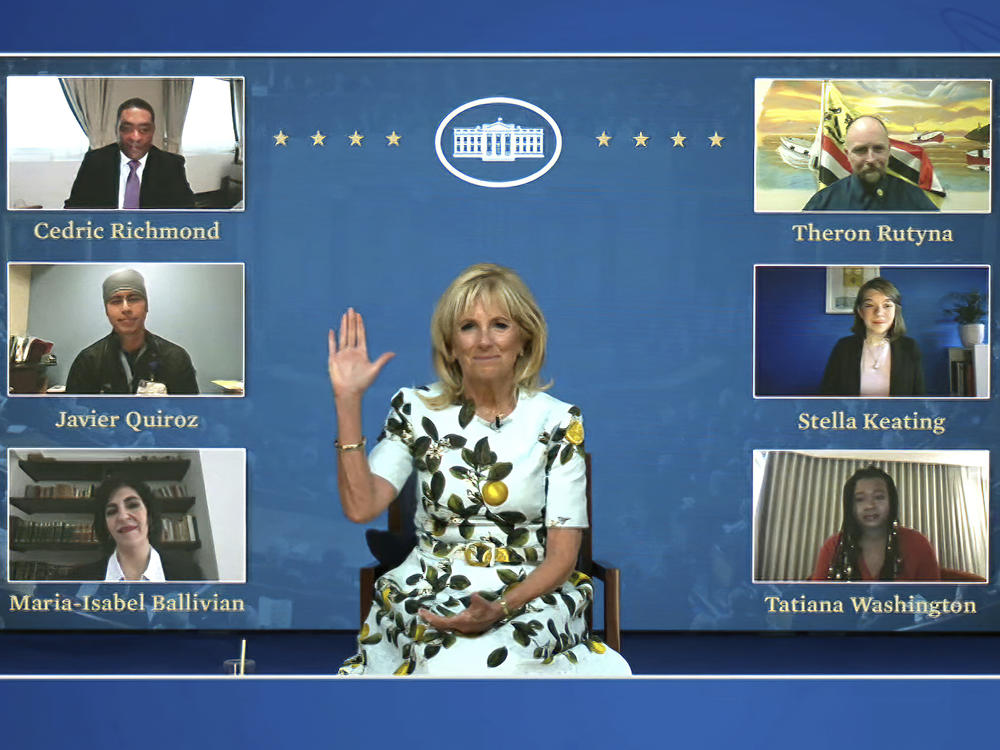Section Branding
Header Content
Lawmakers Invite Virtual Guests To Watch Biden's Joint Address From Afar, Too
Primary Content
One hallmark of a president's joint address to Congress is the guest list: In a typical year, the president and first lady invite guests who they say embody the administration's policy agenda and achievements, while lawmakers often choose plus-ones to make political statements of their own.
With in-person attendance limited because of the coronavirus pandemic, however, most politicians will be tuning in remotely as President Biden delivers his remarks on Wednesday night.
But whether they are attending in person or not, many are still honoring individuals from their districts by naming them as their virtual guests.
First lady Jill Biden held a virtual ceremony to introduce her five invitees, while many Democratic lawmakers announced their guests of honor in news releases leading up to the address. Many hail from communities and industries particularly affected by the pandemic and subsequent relief efforts, and many also highlight administration priorities such as immigration, infrastructure and gun control.
The Senate and House Democratic Policy & Communications committees said in a statement that their leaders are spearheading the effort to name virtual guests as a way to uplift ordinary Americans who have benefited under Biden's first 100 days in office.
"While COVID-19 safety protocols mean this year's in-person attendance will be limited, the DPCC leaders say naming virtual guests is an important way for Democrats to honor hardworking men and women across the country who are fueling America's recovery," they wrote. "Members will uplift their virtual guests' stories in local media, share them online using the hashtag #HelpIsHere, and honor their virtual guests in the Congressional Record."
Republican lawmakers do not appear to have mounted a comparable campaign of their own. In the past, members of Congress who are not in the president's party have selected guests who signal a rebuke or reflect their own legislative priorities — such as when scores of Democrats invited immigrants to former President Donald Trump's first address to a joint session of Congress in 2017.
One of the Republican-invited guests at former President Barack Obama's final State of the Union address, in 2016, was Kim Davis, the Kentucky county clerk who went to jail over her refusal to issue marriage licenses to same-sex couples.
The first lady met with her invitees — who include a DACA recipient who works as a nurse, a gun violence prevention advocate and a transgender teenager — in a virtual "viewing box" on Wednesday afternoon. She said they personify the issues that the president has worked to tackle during his first few months in office, from combating the pandemic to defending LGBTQ rights to improving broadband access for students.
"They're the challenges that shape your lives, the things that keep you up at night, and he knows that you're counting on him for real solutions and you can't wait," she said. "Every day when he heads down to the Oval Office or a meeting with his advisers, he takes you with him. Everything he does is for you."
Top Democrats are spotlighting plus-ones who have been helped by the administration's pandemic relief efforts.
House Majority Leader Steny Hoyer, D-Md., is honoring a Panamanian immigrant who was able to keep her four Dunkin' Donuts locations open with assistance from the Paycheck Protection Program. House Speaker Nancy Pelosi's guest is Dr. Kenneth Tai, the chief health officer of a San Francisco community health center that focuses on Asian American and Pacific Islander and low-income patients.
The list of other lawmakers' virtual guests is long and diverse.
It includes a longtime Postal Service worker, a teenager from the Navajo Nation who has been learning remotely, a business owner who opened a restaurant during the pandemic, a physician and pastor who has secured public health department grants for contact tracing and vaccine distribution efforts, the mayor of a New Jersey town, a high school freshman who co-founded a hotline to help senior citizens secure vaccine appointments, and other essential workers.
They will all be watching from afar as Biden addresses a small crowd of lawmakers from the House chamber.
You can follow NPR's coverage of the speech and the Republican response on NPR.org, the NPR One app or your local member station.
Copyright 2021 NPR. To see more, visit https://www.npr.org.

